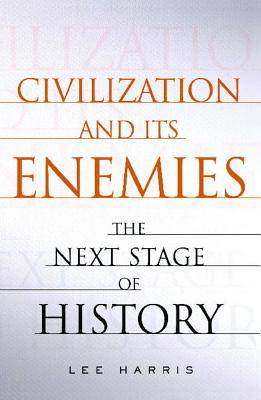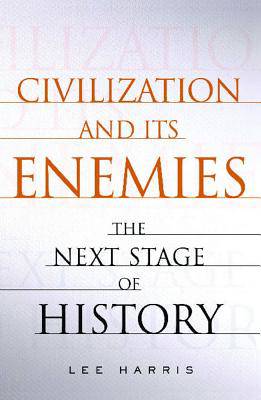
- Retrait gratuit dans votre magasin Club
- 7.000.000 titres dans notre catalogue
- Payer en toute sécurité
- Toujours un magasin près de chez vous
- Retrait gratuit dans votre magasin Club
- 7.000.0000 titres dans notre catalogue
- Payer en toute sécurité
- Toujours un magasin près de chez vous
25,45 €
+ 50 points
Format
Description
Forgetfulness occurs when those who have been long inured to civilized order can no longer remember a time in which they had to wonder whether their crops would grow to maturity without being stolen or their children sold into slavery by a victorious foe....They forget that in time of danger, in the face of the enemy, they must trust and confide in each other, or perish....They forget, in short, that there has ever been a category of human experience called the enemy.
"That, before 9/11, was what had happened to us. The very concept of the enemy had been banished from our moral and political vocabulary. An enemy was just a friend we hadn't done enough for yet. Or perhaps there had been a misunderstanding, or an oversight on our part -- something that we could correct....
"Our first task is therefore to try to grasp what the concept of the enemy really means. The enemy is someone who is willing to die in order to kill you. And while it is true that the enemy always hates us for a reason, it is his reason, and not ours."
So begins Civilization and Its Enemies, an extraordinary tour de force by America's "reigning philosopher of 9/11," Lee Harris. What Francis Fukuyama did for the end of the Cold War, Lee Harris has now done for the next great conflict: the war between the civilized world and the international terrorists who wish to destroy it. Each major turning point in our history has produced one great thinker who has been able to step back from petty disagreements and see the bigger picture -- and Lee Harris has emerged as that man for our time. He is the one who has helped make sense of the terrorists' fantasies and who forces us most strongly to confront the fact that our enemy -- for the first time in centuries -- refuses to play by any of our rules, or to think in any of our categories.
We are all naturally reluctant to face a true enemy. Most of us cannot give up the myth that tolerance is the greatest of virtues and that we can somehow convert the enemy to our beliefs. Yet, as Harris's brilliant tour through the stages of civilization demonstrates, from Sparta to the French Revolution to the present, civilization depends upon brute force, properly wielded by a sovereign. Today, only America can play the role of sovereign on the world stage, by the use of force when necessary.
Lee Harris's articles have been hailed by thinkers from across the spectrum. His message is an enduring one that will change the way readers think -- about the war with Iraq, about terrorism, and about our future.
"That, before 9/11, was what had happened to us. The very concept of the enemy had been banished from our moral and political vocabulary. An enemy was just a friend we hadn't done enough for yet. Or perhaps there had been a misunderstanding, or an oversight on our part -- something that we could correct....
"Our first task is therefore to try to grasp what the concept of the enemy really means. The enemy is someone who is willing to die in order to kill you. And while it is true that the enemy always hates us for a reason, it is his reason, and not ours."
So begins Civilization and Its Enemies, an extraordinary tour de force by America's "reigning philosopher of 9/11," Lee Harris. What Francis Fukuyama did for the end of the Cold War, Lee Harris has now done for the next great conflict: the war between the civilized world and the international terrorists who wish to destroy it. Each major turning point in our history has produced one great thinker who has been able to step back from petty disagreements and see the bigger picture -- and Lee Harris has emerged as that man for our time. He is the one who has helped make sense of the terrorists' fantasies and who forces us most strongly to confront the fact that our enemy -- for the first time in centuries -- refuses to play by any of our rules, or to think in any of our categories.
We are all naturally reluctant to face a true enemy. Most of us cannot give up the myth that tolerance is the greatest of virtues and that we can somehow convert the enemy to our beliefs. Yet, as Harris's brilliant tour through the stages of civilization demonstrates, from Sparta to the French Revolution to the present, civilization depends upon brute force, properly wielded by a sovereign. Today, only America can play the role of sovereign on the world stage, by the use of force when necessary.
Lee Harris's articles have been hailed by thinkers from across the spectrum. His message is an enduring one that will change the way readers think -- about the war with Iraq, about terrorism, and about our future.
Spécifications
Parties prenantes
- Auteur(s) :
- Editeur:
Contenu
- Nombre de pages :
- 256
- Langue:
- Anglais
Caractéristiques
- EAN:
- 9781451655339
- Date de parution :
- 14-01-12
- Format:
- Livre broché
- Format numérique:
- Trade paperback (VS)
- Dimensions :
- 147 mm x 229 mm
- Poids :
- 294 g

Les avis
Nous publions uniquement les avis qui respectent les conditions requises. Consultez nos conditions pour les avis.






